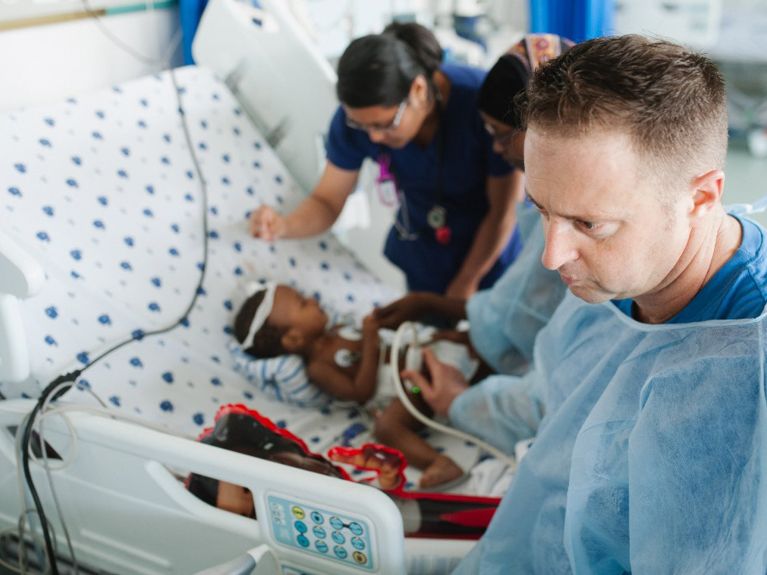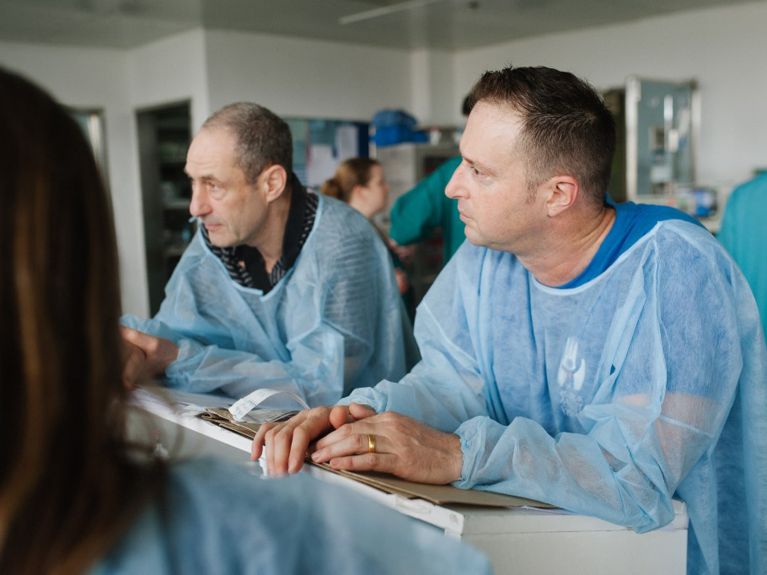How knowledge transfer saves lives
German and Israeli doctors are helping set up a cardiology clinic in Tanzania. And they don’t only treat children with heart problems; there is another task that is almost even more important.

The babies are sweating, breathing quickly and heavily. Some turn slightly blue in the face as they scream. Children with congenital heart problems demonstrate typical symptoms – and if left untreated, they run the risk of heart failure and death. In industrialized nations these children have excellent survival chances thanks to the generally very good medical care. The same cannot be said of many African countries, such as Tanzania. Now, a German and an Israeli wish together with their teams to combat this. They are Professor Felix Berger, Director of the Department of Congenital Heart Disease – Pediatric Cardiology at the German Heart Center Berlin (DHZB) and at Charité-Universitätsmedizin Berlin, and Dr. Sagi Assa, paediatric cardiologist at Wolfson Medical Center in Tel Aviv. Since 2016 they have travelled to Dar es Salaam for one week each year, accompanied by 20 doctors and nursing staff from both hospitals. On the ground, they have helped at the Jakaya Kikwete Cardiac Institute Muhimbili, where the doctors perform operations with the heart catheter and – and this is at least equally important – pass on their specialist knowledge to Tanzanian doctors.
Passing on know-how
“The long-term objective is for the local doctors to run the paediatric cardiology clinic on their own,” says Berger. “A surgeon trained at the Wolfson Medical Center is already performing operations for simple heart defects; the heart catheter programme is still in the process of development, however.” The international team trains the Tanzanian medical staff in using the catheter and in screening potential patients. The mission was initiated by the Israeli-international organization “Save a Child’s Heart” (SACH), which works to improve medical care for children with heart defects in many countries. Sagi Assa, who has been supporting SACH for 15 years now, had the idea for the project in Tanzania – and himself undertook further training for two years at the renowned DHZB in Berlin to prepare himself for it. When he asked his fellow doctors in Berlin if they likewise wanted to be involved in the Tanzanian project, they immediately all said yes. “It is an honour for me to continue working with them,” says Assa.
Great care
When the German-Israeli medical team is in Dar es Salaam, families, many of whom have been travelling for days, wait for treatment in the clinic. Prior to the doctors’ arrival, SACH helpers locate children all over the country who are eligible for the minimally invasive procedure. “These are always very long, busy days for us,” notes Berger, “after all, we want to help as many patients as possible.” Despite the tight schedule, the cardiologists take the utmost care, as Assa emphasizes: “No two cases are alike. Where diagnosis is difficult we first discuss as a team which treatment options are viable.” Although most of the children suffer from simple heart defects, the doctors often face challenges: “When the defects are not treated immediately after birth, they become highly complex,” explains Berger. One particular case requiring intense deliberation was the heart defect of a nine-month-old boy who came to his initial medical examination in a poor physical condition. “Catheter surgery was risky for the little boy, so we considered long and hard whether we could operate,” Sagi Assa recalls. The doctors opted for the treatment – and saved Swalehe’s life. “Two days after the operation he was sucking a sweet with a smile on his face; that was a delightful moment for us doctors too.”
The great commitment of the Tanzanian doctors, nursing staff and technicians is a further motivation for the German-Israeli team. “We are also highly enthusiastic about the project and have the feeling we are doing something really meaningful,” says Felix Berger.




